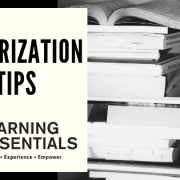Memorization Tips
We all forget things from time to time. Yet students with deficits in working memory, or those who struggle with memory processing disorder, experience an added layer of difficulty when studying for assessments, reviewing material, or simply grasping concepts upon initial introduction. Since many students with memory deficiencies have coexisting learning disabilities, such as ADHD, dyslexia, dyspraxia, etc., organizing information input and output can be daunting.
Fortunately, there are several ways to help these students process information differently and enhance their recall.
Establishing bizarre connections can help students memorize otherwise arbitrary facts:
If an upcoming spelling test included two similar words, like desert and dessert, it may be difficult to remember which word contains the ss. To help memorize the spelling, consider the fact that, if given the choice, we would rather have two desserts after dinner, not two deserts. Similarly, if the spelling test includes the term neighbor, imagine that Old McDonald is your neighbor to remember the vowel order “eio,” just like the song.
To remember that water freezes at 32 degrees fahrenheit, 0 degrees celsius, think of a person’s phone number or address that includes the number 32. Then visualize that person texting on an iceberg or calling from the freezer. As ridiculous as these visual connections may seem, they help provide anecdotal cues to a student who struggles to memorize facts.
Memory maps help link familiar places to random facts:
If a student is trying to memorize the allied nations for a WWII exam, he might find it beneficial to visualize his house as the United States with an American flag, his next door neighbors as France and the United Kingdom with their respective flags, and his neighbors across the street as the Soviet Union and China. To solidify the memory, perhaps he will visualize a block party in which different households bring food or drink items that represent those nations, like tea for the UK, croissants for France, egg rolls for China, etc.
Use key words or word play to help learn and then memorize vocabulary:
Take the Latin root voc, for instance, meaning call or voice. The word advocate means to speak up for someone or something. Vociferous describes someone who is vocal or outspoken. Someone’s vocation is their career, or what they have been called to do in life. Convocation is a formal assembly of people or people that have been called together to meet and discuss. Multisyllabic terms can also be broken down into more manageable segments to help memorize definitions as well. For example, indefatigable is easier to understand after learning the word fatigue. The combination of the root syllables prompts students to remember that indefatigable means someone that works tirelessly or with unwavering enthusiasm.
Mnemonic devices and acronyms also work when students are tasked with memorizing ordered terms or processes—the sillier or more personalized the better to solidify memories and activate recall. We all know ROY G BIV for the colors of the rainbow, but what about May I have a large container of coffee? This sentence helps students remember the digits of pi—each letter of the word in the sentence represents the next numeral 3.1415927.
Be creative with your students and help them to devise strategies and memory maps that help them to store and recall information. Make it fun!




